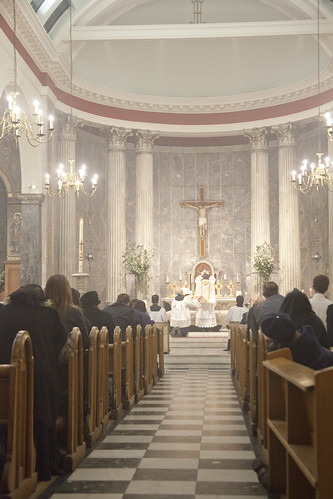 |
| The Consecration at the Easter Vigil, St Mary Moorfields, London |
The Catholic Times, 3 April 2015:
The undoubted reality of the Presence of Christ’s
Body, Blood, Soul and Divinity is not a physical presence, but a spiritual
presence.
The equally
undoubted resurrection of our bodies will not be a copy of Lazarus being raised
from the dead. Our bodies will not be re-animated, or come back to life with
their physical properties. Physical bodies require a place to be displayed, but
Heaven is not a place. … We ourselves will be raised from the dead, it is our
bodies that will rise, this is the continuity. But rather than speaking of a ‘spiritual
body’ we need to think of the spiritual reality of our body, because we will
then be animated not by our soul but by the spirit of the Risen Christ.
Sorry, Basil, but the body is physical: to say our spiritual, resurrected bodies will lack any physical manifestation or location is simply to deny the Resurrection of the Body. How is Loftus' picture of our existence after the Resurrection different from our existence before the Resurrection, as separated souls in heaven? How is it compatible with St Thomas the Apostle being able to touch the Resurrected Lord, and place his fingers in His wounds?
And what's this about being animated by Christ and not by our own souls? Has Basil taken up monopsychism? (The view that we all share one soul.) Before we get too lost, let's remind ourselves of what the Catechism of the Catholic Church says:
997 What is "rising"? In death, the separation of the soul from the body, the human body decays and the soul goes to meet God, while awaiting its reunion with its glorified body. God, in his almighty power, will definitively grant incorruptible life to our bodies by reuniting them with our souls, through the power of Jesus' Resurrection.
And come to that, how is saying that Christ is present in the Blessed Sacrament in a spiritual, but not in a physical, way, different from Calvin's doctrine of the Eucharist? It was precisely to counter this that Bl. Pope Paul VI wrote (Mysterium Fidei 1965):
For what now lies beneath the aforementioned species is not what was there before, but something completely different; and not just in the estimation of Church belief but in reality, since once the substance or nature of the bread and wine has been changed into the body and blood of Christ, nothing remains of the bread and the wine except for the species—beneath which Christ is present whole and entire in His physical "reality," corporeally present, although not in the manner in which bodies are in a place.
Loftus would appear to have a fundamental problem with this formulation because - as far as it is possible to see - he does not believe that there is any physical reality involved with Christ's own Resurrected Body.
Support the work of the LMS by becoming an 'Anniversary Supporter'.
One could perhaps be generous towards a brother in the Church (is that a Catholic thing to do?) and assume that when he speaks of a physical presence rather than a spiritual one BL is following St. Paul in distinguishing the merely physical from the spiritual body, the physical presence animated by, transparent to the spirit.
ReplyDeleteLanguage breaks under the pressure of trying to describing the indescribable. It may be honest to admit that rather than pretend than anyone has got it all properly worked out, v. CCC997 which comes close to the Greek/Platonic notion of the immortality of the soul that cannot be the Judaeo-Christian belief.
Joseph, I have said before that you go on about Loftus a bit too much. He is what would be described in my part of the world , charitably of course, an eejit.
ReplyDeleteHaving said that his statements are formally heretical and should not have been published by an, apparently, Catholic newspaper.
It might be perfectly accurate to describe Msgr Loftus as an 'eejit'.
DeleteUnfortunately, his heretical views are given credibility when published in a national Catholic newspaper. They are given credibility when this occurs without public sanction from his or the publications Bishop.
While many of us dismiss the heretical views of Msgr Loftus, he has a platform. This platform has the potential to lead souls astray.
Dr. Shaw's exposure of this grave danger is an act of charity.
You have a point!
DeleteShould not this heresy be pointed out to Mgr Loftus' bishop. Perhaps Dr Shaw could refute the heresy in a letter to the Catholic Times & the bishop - in charity of course
ReplyDeleteDavid: both have been done in recent years.
ReplyDeleteSavoranola: my charity towards Mgr Loftus is such that I have examined every column and letter to the Catholic Times he has written about this subject since 2009 inclusive. You'll find the highlights in my dossier of quotations. Not once has he conceded that the Resurrected Lord could be touched, for example: despite being pressed on the issue. It is his refusal to clarify which, in the end, itself makes his position clear.